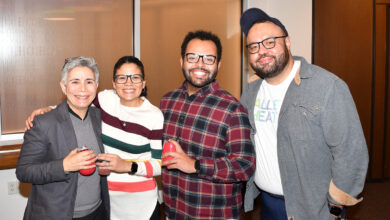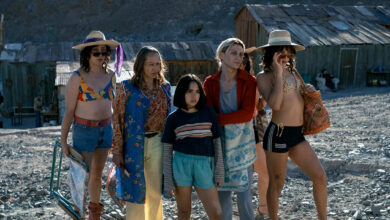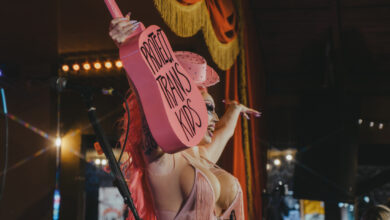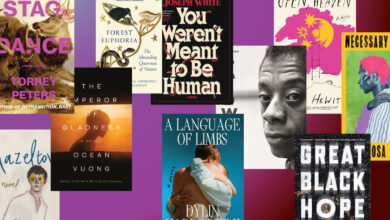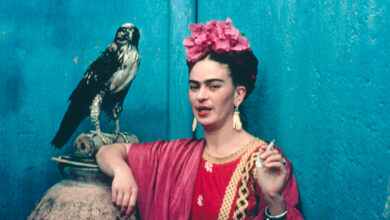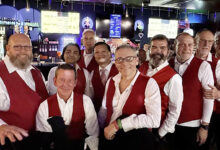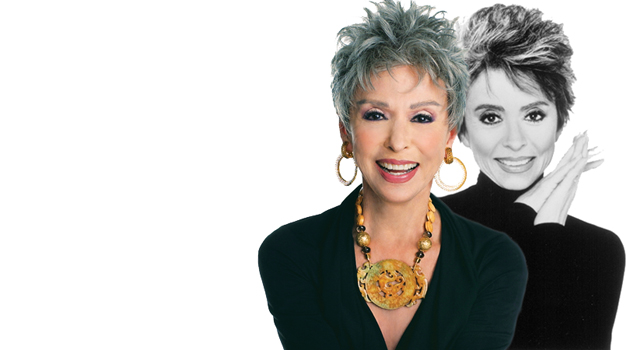
Rita Reigns
Rita Moreno is the recipient of the SAG Lifetime Achievement Award from the Screen Actors Guild this month, so OutSmart is reprinting her 2001 interview with us. See her accept the award on Saturday, January 18, at 7 p.m. (CST), simulcast on TNT and TBS.
Ritzy Rita Moreno has ripened with age, and the multiple-award-winning actress/singer/dancer is still acting, singing, and dancing…and she’s still our darling
by Blase DiStefano
In 1962, Rita Moreno was holding Oscar. Thirteen years later, she was holding Antoinette. She had finally gone bi. Bicoastal, that is. She had won her Academy Award in California and her Antoinette Perry Award (aka Tony) in New York.
Only three years earlier, Moreno had picked up a Grammy. In 1977 and 1978, she picked up a couple of Emmys, at which point she was entered into the Guinness Book of World Records as the only female performer to win all four top entertainment awards!
Since then, Moreno has won, among other awards, the Golden Globe, the Golden Apple, the Cable Ace, the Sarah Siddons, and a star on the Hollywood Walk of Fame.
Rita Moreno was born Rosa Dolores Alverio on December 11, 1932, in Humacao, Puerto Rico, but at the age of 5, she and her mother moved to New York. Though the immigrants were poor, Rosita (as Rita was known) started dancing lessons the following year. When she was 13, she debuted on Broadway in Skydrift with Eli Wallach, and at 17, she met with Louis B. Mayer and was offered a standard seven-year contract with MGM.
She shortened Rosita to Rita (at the behest of Mayer) and used her stepfather’s surname and was nevertheless continually typecast as the Mexican spitfire or Indian maiden…and always barefoot.
In the early ’50s, she had begun an affair with Marlon Brando, which had its ups and downs over many years; her career however was mostly downs. So when Brando married someone else in 1961, Moreno swallowed a handful of sleeping pills; lucky for us, her suicide attempt failed.
Only one year later she won an Oscar for Best Supporting Actress for her role as Anita in West Side Story. At the age of 33, she married Dr. Lenny Gordon, and in 1967, she gave birth to her only child, Fernanda (Nandy) Luisa, who has two children. Grandmother Moreno is still married to Gordon, who retired and became her manager. [Update: Gordon died in 2010.]
In 1968, Moreno received the Joseph Jefferson Award for her performance in The Rose Tattoo by Tennessee Williams. 1972 was the year she won her Grammy for The Electric Company, and in 1975 she received a Tony for her role as Googie Gomez in The Ritz. She earned two Emmys, one in 1977 for her variety appearance on The Muppets and the other in 1978 for her role as a prostitute on The Rockford Files. In 1985, for her role as Olive Madison in the female version of The Odd Couple, she was awarded the Sarah Siddons Award.
You might think that was enough to accomplish in one lifetime. But Moreno also starred in the TV version of the film 9 to 5, played opposite Burt Reynolds in B.L. Stryker from 1989–90, was featured in Fox’s The Top of the Heap, and has been costarring in HBO’s Oz, which began its fifth year in January. [Update: Oz’s series finale aired in early 2003.]
During all of this, Rita Moreno has been a true advocate for human rights in general and has not shied away from gay rights specifically. She was one of the first to do a benefit for AIDS, possibly before Elizabeth Taylor, and she was on the RSVP cruise in 1979, the first to have entertainers.
Now she entertains you with stories about that wonderful cruise, about rehearsals for The Ritz, about…well, read on and enjoy.
Blase DiStefano: In 1975, in People magazine, you were asked about the possibility of playing Googie Gomez in the screen version of The Ritz, and you said, “You know how Hollywood works, they’ll probably let Freddie Prinze play it in drag.”
Rita Moreno: Is that what I said?
Yep. So, do you think Freddie Prinze would have accepted the part?
Uh, let me think. [Pause] He would have been crazy not to. I’m glad it wasn’t offered to him.
Well, I’m really glad, too. I watched it again this weekend and just absolutely loved you in that movie.
It was a wonderful creation.
What do you remember most about making the film?
Well, really what I remember most about doing the play—because in the film we were just simply doing what we did on Broadway for years—was the fun we had. I’d never laughed so hard in all my life. And the cast was like that, too. The hardest thing we had to do on that show was to keep a straight face. I broke myself up all the time. I just thought Googie was so hilarious. It was like I was schizophrenic, like I was two people. I was always Rita listening to this other character, and the character would make Rita laugh. I can still break myself up by thinking of things to do with her attitude and her accent and, well, I would fall on the floor myself.
I would love to have seen the play.
Believe it or not, the play was easily a hundred times funnier because it didn’t have the same director. Richard [Lester] just really couldn’t see what was funny about it. It was the strangest experience. He kept saying, “God, all these words.” And the first time I heard him say that I almost fainted, because I thought, He really doesn’t know. He’s so used to cartoon stuff that he doesn’t realize that it’s not always just visual, but it’s about attitude. That whole play of Terrence McNally’s is always about attitude. And that’s what was so hilarious about it.
Was Jack Weston one of the few who was also in the movie?
Almost everybody was from the original, including the ghastly boy dancers. Talking about those boys reminds me… I’ve done a couple of scenes from that show since then for a few benefits, and I must tell you it’s gotten even funnier.
Phyllis Newman does a wonderful charity benefit show every year for AIDS and breast cancer. It’s Broadway Cares. And she had asked me to do a song, “Everything’s Coming Up Roses.” I told her that the song really pays off when you do the scene prior to it. Or a scene to establish who Googie is. So she watched [The Ritz] at home and called me up the next day and said, “Oh my God, you’re right.” So I did the scene where Googie tells the man who she thinks is a producer that she was in the Sound of Music, and he says, “You were in the Sound of Music?” And she says, “Oh, chure.” And he says, “What part did you play?” and she says, “One of those f—ing brat kids.”
So we did that scene with another actor, and then I said, “Oh, they’re announcing me,” and I ran offstage and came onstage and did the number with two wonderful guys who were just horrible. We were leaping around in the air like crazed gazelles. I mean, these bad, bad ballet leaps. In other words, we refined the choreography, and it was just absolutely hilarious.
Anyway, it is just so much fun to do it years and years later because, hard as it is to believe, you find new stuff to add to it. And the funny thing is that I was more restrained than I was in the movie. And funnier because of the restraints. Because the more legit she tries to be, the funnier she is.
Let’s go from Googie to gay pride. In 1985 while you were doing The Odd Couple, there was a full-page gay pride ad that was supposed to run in Newsweek, Time, and U.S. News and World Report. In the ad was a picture of you with a personal statement supporting human rights. They rejected the ad.
Even Newsweek?
Even Newsweek. Even then, you said you were surprised, especially for Newsweek because of their liberal stand. But that was back in ’85. I wondered now, from your vantage point, what do you think the climate is like now for gays compared to then?
Certainly the door is ajar, I just don’t think it’s wide open.
At least there are a few who are openly gay now.
Right, who are still working. That’s the crux of the matter.
When you accepted your Oscar for West Side Story, did you feel at the time that it would be better for minorities after you won?
I didn’t even think of that. I thought it was such an anomaly. And indeed it was in a way. It didn’t change things much at all. What it did change, which I didn’t know for years and years and years, was the climate within the Hispanic community. I cannot tell you how many Hispanic stars have since then either said in print or told me personally that my appearance in that movie and then getting the Oscar meant all the difference to them to the extent that they then felt that they could be in show business and that somehow they could make it happen for them. Edward James Olmos, Jimmy Smits, and John Leguizamo told me that. Rosie Perez told me that. And Jennifer Lopez has said it in print tons of times. Isn’t that fascinating?
It’s wonderful.
But it’s nothing I ever knew. I had no idea. And when I got my star on the Hollywood Walk of Fame, they had a big bash for me that night. And every Latino in the world showed up for it. It was really quite extraordinary, because usually when actors get stars, the press shows up and that’s it, that afternoon.
[I was also given] a bash that night at the Beverly Hilton. And Morgan Freeman flew in at his own expense to emcee the show. Ruben Blades, who’s back was so out of joint he could barely walk to the middle of the stage, came and sang a couple of songs. Celia Cruz, the Queen of Salsa, flew in and did part of the show. Paul Rodriguez showed up, [as did] Liz Torres and Eddie Olmos. [Edward James Olmos had presented Moreno with the star that afternoon on Hollywood Blvd.]
And what was really so moving to me was what Paul Rodriguez and Liz Torres said. Paul I never expected to get serious because he’s just not that way, and at one point through his wonderful funny stand-up, he said, “I just want you to know that when I was a kid living in East L.A., none of us in that neighborhood had a clue who our congressman was, who our councilman was, who our senator was, but we knew who Rita Moreno was.” All this was a huge surprise to me, and I just started to cry. Then Liz Torres gets up. Oh, she killed me. She sang the Puerto Rican national anthem a cappella in Spanish. Which was really kind of brave because nobody knew what the hell she was singing about. But it was our anthem. And then she said to the audience, “You know, when Rita won her Oscar for West Side Story, I lived in the Hispanic ghetto in New York, and that’s a pretty noisy place, but I have to tell you that when they started to name the names of the nominees, that neighborhood got absolutely silent. And when Rita’s name was called, it went up in flames.” Isn’t that amazing.
I’ve got goose bumps.
Well, I get goose bumps, because I never ever perceived myself that way. And I didn’t know this for years and years. The Hispanic community doesn’t have a tradition of writing fan mail; that’s a very American thing. So I never got any feedback from my community. I never had a clue. And now kids who shouldn’t know me, know me because of the parents who talk about me. There are kids who have been named after me. It is just astonishing. And I honestly don’t think of myself in any iconic ways.
When I first met Rosie Perez, she started to tremble and cry. And I kept thinking, I wonder what’s wrong, somebody must have said something terrible to her. And it wasn’t that at all, it was me. My presence, my holding her hand. Because I said, “Gee, I have been wanting to meet you, and I hear you are a fan of mine,” and she just stared at me and these great tears came into her eyes and she started to tremble. Can you imagine? Having somebody do that?
Well, that does tell you a lot about how we think of you.
And you know that is the other thing, the gay community has always been just absolutely warm and lovely and devoted.
I’m sure part of that is your response. You’re such an open, honest, giving person.
I have to tell you that I was the very first celebrity person to do a benefit for AIDS at the Hollywood Bowl. It was the very first time they had done one.
You’re kidding.
I’m not kidding, no. And in fact it was such a new and bold thing…well, it was bold on their terms, not for me it wasn’t…that all the local TV people showed up sticking the mics in my face saying, “Why are you doing this?” And my only response was, “Why wouldn’t I? What a silly question.” And then about a year or two later, Elizabeth Taylor became involved.
Do you have any stories about the show?
First of all, I had included my daughter in the act.
Oh really, about how old was she?
Fernando was about 16. And we did two numbers together. We did “America” from West Side Story, and then we did an aerobics-type number by Michael Jackson, “You Got Me Working Day and Night.” The applause was thunderous. As I went backstage after the show, I said to her, “Don’t ever, ever expect that to happen again. This is a very special audience.”
Another story about that night is that they had a lot of gay and lesbian marching bands. And it so happens that in my act I used to open with “Strike Up the Band.” So we decided to close with it and have all the bands come on and sing. But to rehearse this many bands is a nightmare, because number one, it’s almost impossible for that many drum people to keep time. So the rehearsal of that number was really just very long and very arduous. And finally they seemed to be getting it right so that we were together. And when we finally got to that point, my conductor said to everybody, “Okay, it seems to be clarified now. Is everybody straight?” And a chorus of hundreds of voices said, “NO!” I thought my drummer would pee in his pants, I laughed so loud.
[Laughs] You seem to have always been there for gay people. I remember an ad in The Advocate that pictured you as part of the entertainment for an RSVP cruise.
Oh yeah, in fact I was on the first that had a show.
How neat. Really the first one?
The first one that had a show, with Waylan Flowers and Quentin Crisp. He was really a terrible little man.
Who?
Quentin Crisp.
Really?
The whole gay population on the ship really got to dislike him because he actually called AIDS—at a time when everybody was really realizing what a scourge this illness is—a fad, a trend.
What?
Yeah. And they just sat there goggle-eyed with their jaws on their laps, because we’re talking about almost all gay people on this ship. And they were just appalled. Absolutely appalled. And we started to scold him. It was just awful. Till then he was funny and he was very sharp-tongued and all that, not my kind of humor, but you know, he was what he was, and then he comes up with this thing. I guess he was feeling his oats because everyone was there so ready to love him.
Yeah, but did he not know…
He was just extremely ignorant, but not to know at that point…. But two charming things happened on that ship. By the way it was the most fun trip I’ve ever had on a ship. And everyone kept saying, “This is so much fun, why is this so much fun?” I said, “I know why, it’s because there are no secrets on this ship. No one has to pretend.” Everyone was so open, it was such a gas. My husband had a great time, and the other few people who were straight as arrows just loved it and had such a good time.
Any anecdotes?
We were on deck, and the ship was departing from New Orleans, and they had music going and big purple balloons, and they were serving champagne, and wonderful music was blasting through the loudspeakers, like Gershwin, something marvelous, and I’m moving around meeting everybody, just introducing myself to people, and I remember saying to one guy, “So, do you cruise often?” And he said, “Dahling, all the time.”
[Both laugh]
And then we go down to the purser’s office to get our passports, and on the desk was this bowl of what I thought was chocolate mints.
They were not chocolate mints apparently.
I said to my husband, “Oh look, darling, isn’t that lovely, how thoughtful of them to give us some free chocolates.” Oh, Trojans. Here I am at the top of my lungs—“TROJANS!” And then when I did the show, on the way up I ran into some guys who just went nuts for what I was wearing. And after my opening number, I said, “Let me establish immediately, you cannot have my earrings.” It was the loosest, funniest show I have ever done. I mean I just let it go. I let her rip. Some of the guys showed up with towels around their waist and wing collars and tuxes and black ties because it was formal night. It was just so much fun and so charming.
It makes me want to have been there.
Oh, it was delicious. They had a bingo night and [Wayland Flowers’] Madame called out all the numbers. And of course when she called out “69,” everybody went crazy. And then they had a costume contest that Madame and I judged. Well, my dear, there were trunks on board for people. Everybody was dressed to the nines every night. It was really just wonderful. We made some great friends. It was the best. Talk about “We Are the World.”
How was your husband through all this?
They loved my husband. My husband was the kind of doctor, when he was practicing, who had a big gay practice. Because he was so sweet and kind, it almost sounds patronizing to say that, but in those days doctors apparently were not very nice to gays. They would get big lectures and really terrible attitudes, and Lenny would never, never do anything like that. Anyway, he had a big gay practice, and word got around real fast, There is this wonderful doctor who knows what he’s doing and he’s also a nice person. And as a result he also got gangsters. He had the goddamnedest practice you ever saw. He had a lot of Puerto Ricans. And he was nice to them. He was in a kind of fancy building with a doorman, and they always knew who his patients were. “You’re here for Dr. Gordon, right?” It was either a Mafioso-looking guy or a Puerto Rican or a chorus girl.
Or a drag queen.
Or a drag queen. How could I not marry a guy like this?
Okay, now you were on the cover of Ms. magazine in 1979.
God, you did your homework.
There was a caption, “Rita Moreno is a stair bounder.”
Oh, God, I remember I was jumping off the steps on the cover. It was a way of keeping in shape.
Apparently it helped for your role in Sunset Boulevard where you had to climb 400 steps.
Well, that came much later, before I really finished off my knees.
What happened?
Well, they weren’t good to begin with at that point. And in order to come down steps and make a grand entrance, you have to go up steps backstage. And I was weighing in at 107 pounds. And I was wearing 20- and 30-pound costumes, so I was bearing weight that was way past what anybody my size should be doing. So I ended up with serious big-time medical braces on my knees under the costumes, because it was the only way I could do it.
Most of the times when I had scene changes, I had to run up the stairs backstage and then very calmly come down the steps in front of the audience. But a few times I had enough time to go up slowly. So I learned to shimmy backwards. I would go on my behind. The staircases on both sides of the stage had rails, so I would pull myself up literally with my arms. Well, my arms and my back got so gorgeous. At first they started to laugh and say that was the funniest sight they had ever seen—me shimmying up on my ass. But at the same time they were full of admiration because nobody had ever thought of that before. Honey, I got truck-driver arms and upper back while I was doing it.
[Laughs] I guess there’s always good out of bad, isn’t there?
There you go.
Now you’re a nun!
Isn’t she wonderful?
I don’t have HBO right now, but I did get to see the first season [of Oz].
Well, you missed some of the good stuff because the second and third year, she began to get a serious attraction to one of the prisoners. We’re afraid of nothing on that show.
Who came up with that premise?
It was my idea actually. I went to Tom Fontana, the producer/writer, and I asked if anyone had ever explored the physical yearnings of religious people. And right away his eyebrows shot up. I said it would be so interesting for Sister Pete to find somebody actually attractive…the dilemma, what do you do? Oh, he handled it fabulously. [Fontana] was going to be a Jesuit many, many years ago. But you take one look at Oz, and you say that definitely didn’t work. It has a huge gay following.
Two of the leading characters who play lovers on Oz were at the GLAAD awards, and one of them kissed the other guy.
It was wonderful, because they are as straight as they can be. They have love scenes in the show, and it’s just amazing. They just go right for the mouth, and they part their lips. It’s so astonishing that they are so easy with it.
When you were younger, they wouldn’t have done this in the movies, but…
Oh God no.
But would you kiss a woman for a role?
Of course I would! And while we’re on the subject, it made me so sad that Ellen DeGeneres’s show was pulled off the air.
But I heard that she’s supposed to be coming back on soon.
Yeah, I hope that works. I really wish her the best. She’s quite a remarkable woman.
Yeah, that was really an amazing thing for her to do. It changed a lot of our lives.
Does anybody have any idea why she and Anne Heche separated?
I don’t know, but it was odd that only a short time later Melissa Etheridge and Julie Cypher separated.
Wow, they were together a long time.
Yeah, and they even have a baby. Supposedly Brad Pitt’s. Just kidding.
Your lips to God’s ears, dear.
[Laughs] Okay, while I’m being silly, here are a couple of silly questions. You’re stranded on a desert island, and you can have only one film. What would it be?
Okay, that is a great question…if I had only one film. I think Cinema Paradiso. The first thing that occurred to me was Citizen Kane, but then I thought there is something about Cinema Paradiso that is so extraordinary.
Now on that same island, you can have only one person, but it cannot be your husband, your family, or a friend. It has to be somebody that you don’t know personally.
Okay, let me see. I think it would have to be somebody in the psychological world, because there are always endless things to learn. Or a historian, I think Richard Russell, a philosopher and a historian. And he could really keep me interested forever and ever. History, there was also f–king and also betrayal, God knows. I mean it had all the makings of a great movie, right?
Right. One last question: Since mostly gays read this magazine, do you have any encouraging words for us now that Bush is in office?
Oy vey!
That’s all you need to say.
Oh my God, I have to say that my husband is taking it even harder than I am, if that is possible. We look at all these new appointments that he’s making, and I guess what makes it so hard to take is that he doesn’t really belong there. He didn’t win that election. That’s what makes people like myself just so crazy. Because it’s not as though he won it fair and square.
Rita Moreno was in Houston with her cabaret act with the Houston Symphony on March 2, 3, and 4, 2001. And to honor her appearance in Houston, The Ritz was scheduled to be shown at the Houston Lesbian & Gay Community Center.



